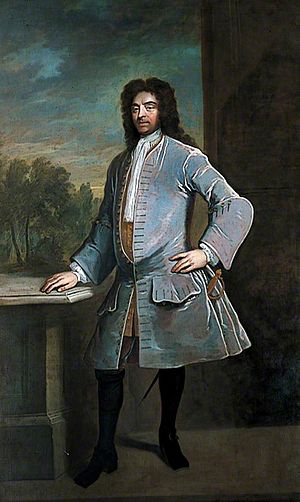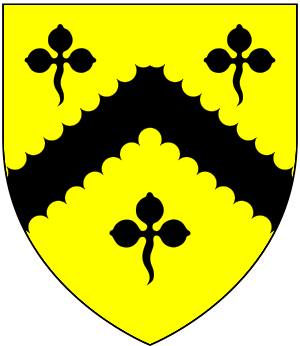Joseph Williamson (English politician) facts for kids
Quick facts for kids
Joseph Williamson
|
|
|---|---|

Portrait by Godfrey Kneller
|
|
| Member of the English Parliament | |
| 1701 1698-1699 1695-1696 |
Thetford |
| 1690-1701 | Rochester |
| Member of the Parliament of Ireland | |
| 1695-1699 | Limerick City |
| 1695 | Portarlington |
| 1692-1693 | County Clare |
| 2nd President of the Royal Society | |
| In office 1677–1680 |
|
| Preceded by | William Brouncker |
| Succeeded by | Christopher Wren |
| Secretary of State for the Northern Department | |
| In office 1674–1679 |
|
| Preceded by | Henry Coventry |
| Succeeded by | Robert Spencer |
| Personal details | |
| Born | 25 July 1633 Bridekirk |
| Died | 3 October 1701 (aged 68) Cobham, Kent |
| Resting place | Westminster Abbey |
| Spouses | Katherine Stewart, Baroness Clifton |
Sir Joseph Williamson (born July 25, 1633 – died October 3, 1701) was an important English government official, diplomat, and politician. He served in the House of Commons of England and the Irish House of Commons for many years. From 1674 to 1679, he was the Secretary of State for the Northern Department, a very powerful position in the government.
Contents
Early Life and Education
Joseph Williamson was born in Bridekirk, a small village near Cockermouth in Cumberland, England. His father, also named Joseph, was a local church leader. Sadly, his father passed away when Joseph was very young. His mother later married Reverend John Ardery.
Because he came from a humble background, some people later made fun of him, especially after he married into a noble family. Joseph went to St. Bees School and Westminster School. He then studied at Queen's College, Oxford, where he became a fellow, which means he was a junior member of the college staff.
Beginning His Career
In 1660, Joseph Williamson began working for Sir Edward Nicholas, who was the Secretary of State for the Southern Department. He kept his job when Sir Henry Bennet, later Earl of Arlington, took over. Joseph was known for working incredibly hard. This made him very valuable to Arlington, who let him handle most of the daily tasks of the department.
Joseph also helped start the London Gazette in 1665. This was an important newspaper at the time.
Becoming a Member of Parliament
In 1669, Williamson was elected as a Member of Parliament (MP) for Thetford. He held this position until 1685. Before this, he had tried three times to become an MP but failed. People were not happy with government candidates back then. Samuel Pepys, a famous diarist, wrote that in 1666, people shouted "No courtiers!" when Williamson tried to speak. In 1672, Joseph was made a clerk of the council and was given the title of Sir.
Diplomatic Work and Key Roles
During the Third Anglo-Dutch War, Sir Joseph helped create plans for a military expedition to the Netherlands. However, these plans were stopped after a naval defeat and a peace treaty.
From 1673 to 1674, he represented England at a big meeting called the Congress of Cologne. In 1674, he became the Secretary of State for the Northern Department. He actually bought this important job for £6,000, which was a huge amount of money back then! He later sold the position for the same amount when he left in 1679.
From 1676 to 1677, he was the Master of The Clothworkers' Company, a group of people involved in the cloth trade. In 1677, he became the second President of the Royal Society, a famous group dedicated to science. However, Sir Joseph was more interested in old historical items than in science.
As Secretary of State, he generally followed the policy of being friendly with France and less so with the Netherlands. He also represented England at another important meeting called the Congress of Nijmegen (1678–79). William III of Orange, a powerful Dutch leader, really disliked Williamson. He thought Williamson's messages were too bossy, like he was talking to a child.
Political Challenges
Just before he was removed from his job as Secretary of State, Sir Joseph faced a difficult time. He was briefly held due to false accusations, but King Charles II quickly ordered his release. Williamson was a target because he was one of the few government officials who did not believe the false stories being spread at the time. He had a good intelligence network that told him about the people making these accusations.
The King, who also doubted the stories, wanted to keep Williamson working for him. However, the stress began to affect Williamson. King Charles eventually dismissed him after Williamson ordered a search of the Queen's official home without the King's permission. The King was very angry and told him that he didn't want to be served by someone who was more afraid of others than of him. Some people thought that another powerful politician, Danby, might have played a part in Williamson's downfall. This was because Danby was reportedly upset about Williamson's recent marriage.
Marriage and Family Life
Sir Joseph married Katherine Stewart, who was a noblewoman known as Baroness Clifton. She was the daughter of George Stewart, 9th Seigneur d'Aubigny and the sister of Charles Stewart, 3rd Duke of Richmond. This meant she was related to the royal family. Katherine had several children from her first marriage to Henry O'Brien, Lord Ibrackan, who was an old friend of Williamson. Joseph and Katherine did not have any children together.
Even though marrying into such a high-ranking family seemed like it would help Williamson politically, it actually caused some problems. People gossiped because Katherine remarried only three months after her first husband died. Also, in those days, it was considered improper for a royal duke's sister to marry the son of a country clergyman. Even Katherine's own children were said to be unhappy about the marriage.
Later Career and Legacy
After a quieter period, Sir Joseph Williamson returned to important diplomatic work. In 1698, he signed the Treaty of The Hague (1698), which was the first agreement to divide the Spanish Monarchy's lands. It showed that even though William III of Orange personally disliked Williamson, he still valued his skills as a diplomat. The treaty was a secret, and when the news came out, it caused a big stir in England. However, Williamson himself did not face much criticism.
From 1690 to 1701, Williamson was an MP for Rochester. He was also elected for Thetford three times, but he always chose to represent Rochester instead.
Between 1692 and 1695, he was also an MP in the Irish House of Commons for County Clare. He later represented Portarlington for a few months in 1695 and then Limerick City until 1699. In 1696, he was honored with the "Freedom of the City of Dublin" because of his interest in improving the city. In return, he gave the city leaders a silver cup.
Death and Reputation
Sir Joseph Williamson passed away in Cobham, Kent, on October 3, 1701. He was buried in Westminster Abbey, a very famous church where many important people are laid to rest. His wife joined him there a year later.
Williamson became very wealthy because his government positions offered many ways to make money. He left a lot of his wealth to good causes. He gave £6,000 and his large library to Queen's College, Oxford. He also left £5,000 to start a school in Rochester, which is now known as Sir Joseph Williamson's Mathematical School. He also gave £2,000 to Thetford. Many of his letters and notes are still kept today, giving us valuable information about his time.
He is remembered as one of the best government officials of his era. He is praised for creating an intelligence service that was very effective. His detailed notes from government meetings are a great source of information about how things worked, especially during a political crisis in 1678–79.
However, he was not a very good public speaker. Even King Charles II, who was also a quiet speaker, complained that Williamson "droned" on. He was also described as dry, formal, and arrogant, and not always a kind employer. But his will, where he remembered everyone who had helped him, shows he could be generous. He also had lifelong friends, like Samuel Pepys.
In Fiction
Sir Joseph Williamson appears as a character in some mystery novels. He is often shown in a somewhat villainous role in the Thomas Chaloner series by Susanna Gregory. His wife and her first husband also appear in one of these books. Williamson is also a regular character in Andrew Taylor's novels about a government clerk named James Marwood and an architect named Cat Lovett.
See also
Sources
- Kenyon J.P. The Popish Plot William Heinemann, 1972; Phoenix Press Reissue 2000, pp. 117–18
| Political offices | ||
|---|---|---|
| Preceded by Henry Coventry |
Secretary of State for the Northern Department 1674–1679 |
Succeeded by The Earl of Sunderland |
| Parliament of England (to 1707) | ||
| Preceded by Sir John Banks, Bt Sir Roger Twisden, Bt |
Member of Parliament for Rochester 1690–1701 With: Francis Clerke 1690–1691 Caleb Banks 1691–1695 Sir Cloudesley Shovell 1695–1701 |
Succeeded by Francis Barrell William Bokenham |
| Preceded by Sir Francis Guybon Baptist May |
Member of Parliament for Thetford 1695–1696 With: Sir John Wodehouse, Bt |
Succeeded by Sir John Wodehouse, Bt |
| Preceded by Sir John Wodehouse, Bt James Sloane |
Member of Parliament for Thetford 1698–1699 With: James Sloane |
Succeeded by James Sloane Lord Paston |
| Preceded by James Sloane Lord Paston |
Member of Parliament for Thetford 1701 With: Edmund Soame |
Succeeded by Edmund Soame Sir Thomas Hanmer |
| Parliament of Ireland | ||
| Unknown | Member of Parliament for County Clare 1692–1693 With: Sir Donough O'Brien, 1st Bt |
Succeeded by Sir Donough O'Brien, 1st Bt Sir Henry Ingoldsby, 1st Bt |
| Preceded by Daniel Gahan Richard Warburton |
Member of Parliament for Portarlington 1695 With: Richard Warburton |
Succeeded by George Warburton Richard Warburton |
| Preceded by Joseph Coghlan Sir Charles Feilding |
Member of Parliament for Limerick City 1695–1699 With: Joseph Coghlan |
Succeeded by Robert Blennerhassett Richard Ingoldsby |
| Professional and academic associations | ||
| Preceded by William Brouncker |
President of the Royal Society 1677–1680 |
Succeeded by Christopher Wren |
 | John T. Biggers |
 | Thomas Blackshear |
 | Mark Bradford |
 | Beverly Buchanan |


